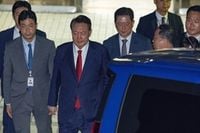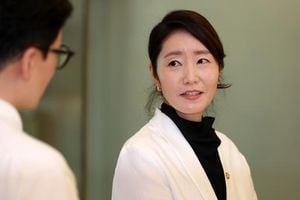After a tense day of legal proceedings, former South Korean President Yoon Suk-yeol finds himself once again at the Seoul Detention Center, awaiting a court decision that could see him detained for up to 20 days amid a high-profile investigation. The court's ruling on his detention warrant, expected late tonight or early tomorrow morning, will determine whether Yoon remains in custody or returns to his home in Seocho-dong.
Yoon's detention warrant review concluded at 9:01 PM on July 9, 2025, after a marathon hearing lasting approximately six hours and 40 minutes. The session, presided over by Judge Nam Se-jin at the Seoul Central District Court, began at 2:22 PM and included two breaks—one at around 4:20 PM and another from 7:07 PM to 8:00 PM. Throughout the hearing, Yoon, dressed in a red necktie and dark suit, remained largely silent, declining to respond to reporters' questions about his feelings or the allegations against him as he left the courthouse shortly after the session ended.
Immediately following the hearing, Yoon was transported to the Seoul Detention Center, where he will stay in a specially designated waiting room for detainees while the court deliberates. This waiting area, a single-story detached building surrounded by a 4.5-meter-high security wall, spans about 20 square meters—twice the size of a typical detention cell—to accommodate multiple detainees if necessary. The room is equipped with a ceiling-mounted air conditioner, sofa, bedding, and a table, and offers access to four terrestrial television channels, though streaming services like YouTube are not permitted. A bathroom within the room features a semi-transparent partition monitored by CCTV, ensuring security while maintaining some privacy.
Yoon's stay in this waiting room is a familiar scenario. He was previously detained in the same facility in January 2025 on charges related to alleged rebellion and abuse of power, before being released in March after the court accepted a request to cancel his detention. Now, four months later, he faces the possibility of returning to custody under similar circumstances.
The special prosecution team, led by Special Prosecutor Park Eok-soo and supported by Deputy Prosecutors Kim Jeong-guk and Jo Jae-cheol among others, mounted a rigorous case for Yoon's detention. Their presentation included a detailed 178-slide PowerPoint outlining the severity of the charges, the risk of re-offense, and potential threats to victims and key witnesses. They also submitted a 300-page opinion document and key evidence such as CCTV footage from a closed meeting held just before the controversial December 3, 2024, martial law declaration.
According to the prosecution, Yoon faces five major allegations: abuse of power related to the National Security Council meeting just before martial law was declared; false propaganda suggesting the martial law was declared and executed through lawful procedures; fabrication and use of false official documents concerning the martial law declaration; obstruction of arrest warrant execution by mobilizing the Presidential Security Service against police and corruption investigators; and instructing the deletion of sensitive content on military command security mobile phones.
Yoon's defense team, comprising lawyers Kim Hong-il, Choi Ji-woo, Song Jin-ho, Chae Myung-sung, Bae Bo-yoon, Yoo Jung-hwa, and Kim Gye-ri, strongly contested the prosecution's claims. They argued that the detention warrant request was "unreasonable," asserting that Yoon had faithfully explained the facts and that legally, no crime had been established. They emphasized that no objective evidence was presented during the special prosecutor's investigation and that testimonies from related parties failed to substantiate the allegations. Yoon himself made a roughly 20-minute statement during the hearing, directly addressing the court.
If the court issues the detention warrant, Yoon will undergo the formal intake procedures at the detention center. This includes a thorough physical examination conducted with all clothes removed except for a simple covering, changing into a detention uniform bearing a new identification number (his previous was 10), fingerprinting, and mugshot photography. He will then be assigned a single cell approximately 10 square meters in size. The presidential security service will cease its protection, and a dedicated correctional officer will be assigned to him during his detention.
On the other hand, if the warrant is rejected, Yoon will be released immediately and return to his residence, which could significantly impact the ongoing special prosecutor's investigation. Supporters of Yoon gathered near the detention center's main gate, numbering around ten, chanting for the warrant's rejection. Meanwhile, banners calling for his release were prominently displayed. The police, anticipating potential unrest, deployed around 360 officers across six platoons to maintain order, prepared to use measures like capsicum spray if illegal protests reminiscent of the January 2025 riot at the Seoul Western District Court occur.
Yoon's legal troubles stem from the December 3, 2024, martial law incident, which has sparked a complex and politically charged investigation. Following his arrest on January 15, 2025, on charges including rebellion, Yoon spent 52 days in detention before being released due to a court decision to cancel his detention. His current situation marks a critical juncture, with the court's imminent decision poised to shape both his fate and the trajectory of South Korea's political landscape.
As Yoon spends what promises to be a sleepless night in the detention center's waiting room, the nation watches closely. The outcome will not only determine his immediate legal status but also reverberate through the country's political and judicial institutions. Whether he faces renewed detention or regains his freedom, the events of this day underscore the intense scrutiny and high stakes surrounding one of South Korea's most prominent political figures.




